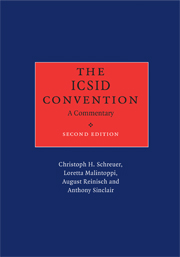Book contents
- Frontmatter
- Contents
- Foreword by Professor Sir Elihu Lauterpacht, CBE, QC
- Authors' preface to the second edition
- Table of cases
- List of abbreviations
- Text of the ICSID Convention
- Procedural calendar
- PREAMBLE
- CHAPTER I International Centre for Settlement of Investment Disputes
- CHAPTER II Jurisdiction of the Centre
- CHAPTER III Conciliation
- CHAPTER IV Arbitration
- Article 36 Request for Arbitration
- Article 37 Composition of Tribunal
- Article 38 Appointment by Chairman
- Article 39 Nationality of Arbitrators
- Article 40 Qualities of Arbitrators
- Article 41 Decision on Jurisdiction
- Article 42 Applicable Law
- Article 43 Evidence
- Article 44 Rules on Procedure
- Article 45 Default of a Party
- Article 46 Ancillary Claims
- Article 47 Provisional Measures
- Article 48 Award
- Article 49 Dispatch, Supplementation and Rectification
- Article 50 Interpretation
- Article 51 Revision
- Article 52 Annulment
- Article 53 Binding Force
- Article 54 Enforcement
- Article 55 State Immunity
- CHAPTER V Replacement and Disqualification of Conciliators and Arbitrators
- CHAPTER VI Cost of Proceedings
- CHAPTER VII Place of Proceedings
- CHAPTER VIII Disputes between Contracting States
- CHAPTER IX Amendment
- CHAPTER X Final Provisions
- Final Clause
- Consolidated bibliography
- Index by article
- Index by subject
Article 46 - Ancillary Claims
from CHAPTER IV - Arbitration
Published online by Cambridge University Press: 07 September 2010
- Frontmatter
- Contents
- Foreword by Professor Sir Elihu Lauterpacht, CBE, QC
- Authors' preface to the second edition
- Table of cases
- List of abbreviations
- Text of the ICSID Convention
- Procedural calendar
- PREAMBLE
- CHAPTER I International Centre for Settlement of Investment Disputes
- CHAPTER II Jurisdiction of the Centre
- CHAPTER III Conciliation
- CHAPTER IV Arbitration
- Article 36 Request for Arbitration
- Article 37 Composition of Tribunal
- Article 38 Appointment by Chairman
- Article 39 Nationality of Arbitrators
- Article 40 Qualities of Arbitrators
- Article 41 Decision on Jurisdiction
- Article 42 Applicable Law
- Article 43 Evidence
- Article 44 Rules on Procedure
- Article 45 Default of a Party
- Article 46 Ancillary Claims
- Article 47 Provisional Measures
- Article 48 Award
- Article 49 Dispatch, Supplementation and Rectification
- Article 50 Interpretation
- Article 51 Revision
- Article 52 Annulment
- Article 53 Binding Force
- Article 54 Enforcement
- Article 55 State Immunity
- CHAPTER V Replacement and Disqualification of Conciliators and Arbitrators
- CHAPTER VI Cost of Proceedings
- CHAPTER VII Place of Proceedings
- CHAPTER VIII Disputes between Contracting States
- CHAPTER IX Amendment
- CHAPTER X Final Provisions
- Final Clause
- Consolidated bibliography
- Index by article
- Index by subject
Summary
INTRODUCTION
The basic idea of Art. 46 is to deal with closely related claims in one set of proceedings. Parallel or consecutive proceedings relating to different aspects of the same dispute are not only costly and inefficient but are also liable to lead to conflicting outcomes. The principles of economy and of finality militate in favour of hearing and deciding all aspects of a dispute in one set of proceedings. (Cf. Art. 26, paras. 124–131.)
An incidental claim arises as a consequence of the primary claim, such as interest or compensation for procedural costs. An additional claim is made by way of a later addendum to the original claim. A counterclaim is put forward by the respondent. The three types of claims may be referred to collectively as ancillary claims (see paras. 32–34 infra).
Provisions for a simultaneous decision on ancillary questions are not uncommon in instruments governing international adjudication. Examples may be found in the Rules of the International Court of Justice (Art. 80), in the 1958 International Law Commission's Model Rules on Arbitral Procedure (Art. 19 on counterclaims or setoff claims and Art. 20 on possible amendments to a claim or defence), in the 1998 International Chamber of Commerce Rules of Arbitration (Arts. 5(5), 19) and in the 1976 UNCITRAL Arbitration Rules (Art. 19(3)).
- Type
- Chapter
- Information
- The ICSID ConventionA Commentary, pp. 731 - 756Publisher: Cambridge University PressPrint publication year: 2009



